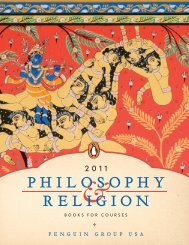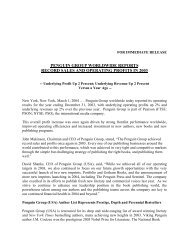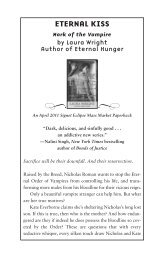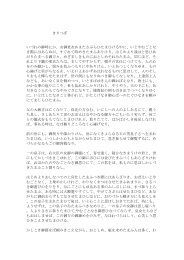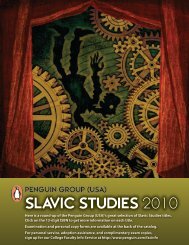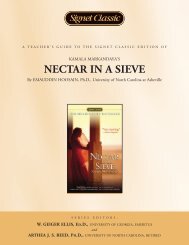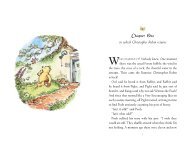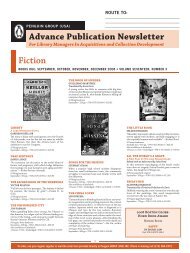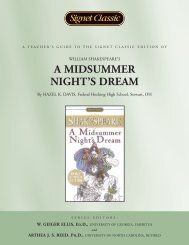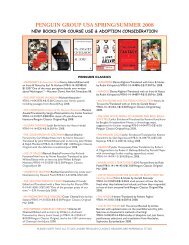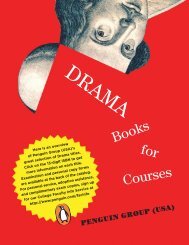Christopher Marlowe's Doctor Faustus - Penguin Group
Christopher Marlowe's Doctor Faustus - Penguin Group
Christopher Marlowe's Doctor Faustus - Penguin Group
You also want an ePaper? Increase the reach of your titles
YUMPU automatically turns print PDFs into web optimized ePapers that Google loves.
26<br />
A Teacher’s Guide to the Signet Classics Edition of <strong>Christopher</strong> Marlowe’s <strong>Doctor</strong> <strong>Faustus</strong><br />
references to horned heads. Is <strong>Faustus</strong> himself a fool? Why or why not? Cite specific scenes<br />
and quotations that support your view.<br />
4. In Act II <strong>Faustus</strong> asserts, “the god thou serv’st is thine own appetite.” Examine Marlowe’s use<br />
of hunger and cravings. Consider the scene with the Seven Deadly Sins as well as the scene<br />
with the pregnant Duchess of Vanholt. What exactly does <strong>Faustus</strong> crave at the start of the<br />
play? Do his appetites change or grow as the play progresses? Is his hunger ever satiated? What<br />
comment might Marlowe be making about the nature of desire?<br />
5. Why are there so many references to dismemberment in Dr. <strong>Faustus</strong>? Who constantly<br />
threatens to tear <strong>Faustus</strong> limb from limb? Why? Does <strong>Faustus</strong> commit a type of self mutilation<br />
when he sells his soul? Why does he lose a limb and his head to the Horse-courser and the<br />
courtiers? Discuss the irony when his body is dismembered in the last scene.<br />
6. Discuss the play’s conflict between fate and free will. Does <strong>Faustus</strong> freely choose to sell his<br />
soul, or is he the victim of fate? Defend your answer. Consider Mephostophilis’ reply when<br />
<strong>Faustus</strong> asks if his conjuring raised the devil:<br />
“That was the cause but yet per accidens:<br />
For when we hear one rack the name of God,<br />
Abjure the Scriptures and his savior Christ,<br />
We fly in hope to get his glorious soul.<br />
Nor will we come unless he use such means<br />
Whereby he is in danger to be damned” (I, iii, 45-50).<br />
Why do <strong>Faustus</strong>’ many considerations of repentance always end in stronger resolve towards<br />
Lucifer?<br />
7. In The Poetics Aristotle defines a tragic hero as a character who occupies a high status or<br />
position and embodies nobility and virtue as part of his innate character. While great, the<br />
tragic hero is not perfect and is therefore able to appear sympathetic to mortal audiences. Due<br />
to this imperfection or flaw (hamartia), which is often pride or arrogance (hubris), the hero’s<br />
downfall is somewhat his own fault, the result of free will rather than fate. However, the hero’s<br />
fall is not completely fair because the punishment exceeds the crime. Prior to his end, the<br />
tragic hero experiences a sense of self discovery and sorrow for his flaw and for the outcomes<br />
it has produced.<br />
Is Dr. <strong>Faustus</strong> a tragic hero? If not, which parts of the definition fit him and which do not?<br />
If he is not a tragic hero, how can he be classified? A heroic humanist? Can a man who sells<br />
his soul be considered a hero of any sort? Is he a villain? Explain your answer.<br />
8. Is ambition a fatal flaw? Consider other ambitious protagonists of the Elizabethan period,<br />
such as Macbeth and Julius Caesar. How does this character trait fit into the humanist view<br />
of the period? Is Marlowe indicting ambition, warning against its dangers, or merely asking<br />
his audience to examine its complicated facets? How is ambition viewed in current society?<br />
Examine the role of ambition today, referencing well-known individuals and the results of<br />
their ambition.<br />
9. Some critics believe the ending of the play is ambiguous and that <strong>Faustus</strong>’ final revelations<br />
lead him to heaven rather than accompany him to hell. Re-read Act V, scenes ii and iii. What<br />
evidence is provided to support each view? What is your interpretation?<br />
10. Is Dr. <strong>Faustus</strong> a Christian allegory or morality play? Or is it an indictment of religion as an<br />
imprisonment of freedom? Consider the characteristics of morality plays and allegories, as<br />
well as man’s historical struggle between science and religion in the Renaissance. Cite specific<br />
evidence from the play to support your answer.




